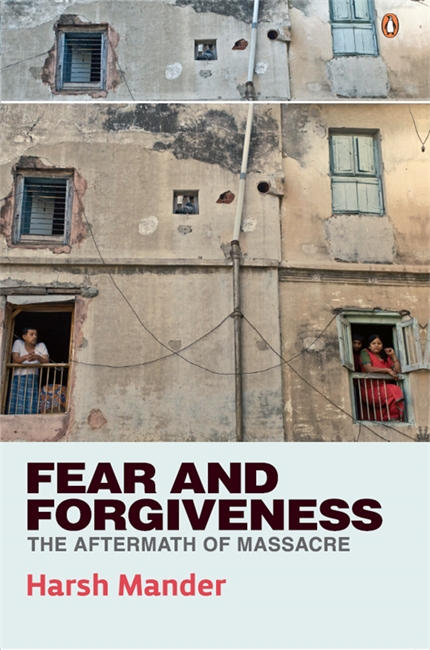
© 2020 Penguin India

‘Human history is not just a history of cruelty, but also of compassion, sacrifice, courage, [and] kindness. What we choose to emphasise in this complex history will define our lives…’-Howard Zinn In February 2002, a violent storm of engineered sectarian hatred broke out and raged for many months in Gujarat; blood flowed freely on the streets and tens of thousands of homes were razed to the ground. An estimated 2000 men, women and children, mostly from the Muslim community, were raped and murdered, and more than two hundred thousand people fled in terror as their homes and livelihoods were systematically destroyed. However, Gujarat abounds with thousands of untold stories of faith and courage that endured amidst the fear and hate-Dhuraji and Babuben Thakur who sheltered 110 Muslims for ten days in their home; of Rambhai Adivasi who restored his Muslim neighbour’s roof in the face of local opposition, Rabiya of Ratanpur who waits in the hope that the people from her village will call her back one day and then every thing will be all right, Bilkis Bano and Niyaz Bibi whose perseverance and determination have made them symbols of courage in the face of adversity. Harsh Mander’s Fear and Forgiveness: The Aftermath of Massacre, written over the past six years, is not just about the grim events of 2002, of the state’s lack of accountability and the failure of justice, of the numerous commissions and their reports, of the indiscriminate use of the draconian Prevention of Terrorism Act 2002, of police brutality and the trauma of relief camps. It is about the acts of compassion and courage, of the hundreds who risked their own lives and those of their families and their homes to save innocent men, women and children, and even today help the betrayed and shattered minority heal and rebuild. The book compels us to acknowledge the flaws in our judicial, social and rehabilitative structures while showing that the way forward must be one of sympathy, understanding and forgiveness.
Imprint: India Penguin
Published: Mar/2009
ISBN:
Length : Pages
MRP : ₹8.99
Imprint: Penguin Audio
Published:
ISBN:
Imprint: India Penguin
Published: Mar/2009
ISBN: 9788184758160
Length : Pages
‘Human history is not just a history of cruelty, but also of compassion, sacrifice, courage, [and] kindness. What we choose to emphasise in this complex history will define our lives…’-Howard Zinn In February 2002, a violent storm of engineered sectarian hatred broke out and raged for many months in Gujarat; blood flowed freely on the streets and tens of thousands of homes were razed to the ground. An estimated 2000 men, women and children, mostly from the Muslim community, were raped and murdered, and more than two hundred thousand people fled in terror as their homes and livelihoods were systematically destroyed. However, Gujarat abounds with thousands of untold stories of faith and courage that endured amidst the fear and hate-Dhuraji and Babuben Thakur who sheltered 110 Muslims for ten days in their home; of Rambhai Adivasi who restored his Muslim neighbour’s roof in the face of local opposition, Rabiya of Ratanpur who waits in the hope that the people from her village will call her back one day and then every thing will be all right, Bilkis Bano and Niyaz Bibi whose perseverance and determination have made them symbols of courage in the face of adversity. Harsh Mander’s Fear and Forgiveness: The Aftermath of Massacre, written over the past six years, is not just about the grim events of 2002, of the state’s lack of accountability and the failure of justice, of the numerous commissions and their reports, of the indiscriminate use of the draconian Prevention of Terrorism Act 2002, of police brutality and the trauma of relief camps. It is about the acts of compassion and courage, of the hundreds who risked their own lives and those of their families and their homes to save innocent men, women and children, and even today help the betrayed and shattered minority heal and rebuild. The book compels us to acknowledge the flaws in our judicial, social and rehabilitative structures while showing that the way forward must be one of sympathy, understanding and forgiveness.
Harsh Mander, fifty-five, social worker and writer, is a member of the National Advisory Council. He is also the founder of the campaigns Aman Biradari, for secularism, peace and justice; Nyayagrah, for legal justice and reconciliation for the survivors of communal violence; and Dil Se, for street children and homeless people. He is special commissioner to the Supreme Court of India in the Right to Food case, and director, Centre for Equity Studies. For almost two decades he worked in the Indian Administrative Service in Madhya Pradesh and Chhattisgarh. He is also associated with causes like tribal, Dalit and disability rights, the right to information, custodial justice and bonded labour.
He writes columns for The Hindu and Hindustan Times, and is the author of Unheard Voices: Stories of Forgotten Lives and Fear and Forgiveness: The Aftermath of Massacre published by Penguin India. Other books include The Ripped Chest: Public Policy and Poor in India and his co-authored Untouchability in Rural India. Harsh has taught in the Indian Institute of Management, Ahmedabad; St Stephen’s College, Delhi; California Institute of Integral Studies, San Francisco; LBS National Academy of Adminsitration, Mussoorie; and the Nelson Mandela Centre for Peace and Conflict Resolution, Jamia Millia Islamia, Delhi, among others.
He lives in Delhi with his wife and daughter.